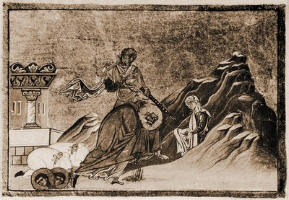
The Works Of Dionysius The Areopagite Volumes 1 & 2
OBJECTIONS TO GENUINENESS
THE most plausible objection to the genuineness of these writings is thus expressed by Dupin: “Eusebius and Jerome wrote an accurate catalogue of each author known to them—with a few obscure exceptions,—and yet never mention the writings of the Areopagite.” Great is the rejoicing in the House of the Anti-Areopagites over this PROOF;—but what are the facts? Eusebius acknowledges that innumerable works have not come to him—Jerome disclaims either to know or to give an accurate catalogue either of authors or works. The Library of Cæsarea contained three hundred thousand volumes, according to the modest computation of Doublet, according to Schneider, many more—Jerome says there are some writings, so illustrious in themselves, that they will not suffer from not being mentioned by him; Jerome follows Dionysius on the Heavenly Hierarchy; Jerome’s Catalogue of Illustrious Men contains one hundred and thirty-five names.
Josephus is mentioned for his testimony to Christ—Seneca, for his correspondence with St. Paul—Philo, for his description of the Therapeutæ of Alexandria. Yet Dupin would have the unwary infer that Jerome gives a full catalogue of each Author known to him, with a few obscure exceptions.
The “Ecclesiastical History” of Eusebius treats of the nature of Christ, the companions of the Apostles, the Martyrdoms—the succession of Bishops—the persecutions—the folk-lore of the Church to the fourth Century. The Book would fill about 125 pages, yet Dupin would have us believe that he gives a complete catalogue; He does not give the writings of Hymenæus and Narcissus, of Athenagoras, and Pantænus, nor a complete list of Clement, Origen, and Dionysius of Alexandria. His silence, in my opinion, is owing to “odium theologicum.” According to Eusebius, Jesus is διττός; according to Dionysius, Jesus is ἁπλοῦς; both true when properly understood, but when misunderstood—“Hinc lachrymæ illæ”—Dupin formed his premise for his conclusion, not from facts.
Copyright ©1999-2023 Wildfire Fellowship, Inc all rights reserved

 Keep Site Running
Keep Site Running